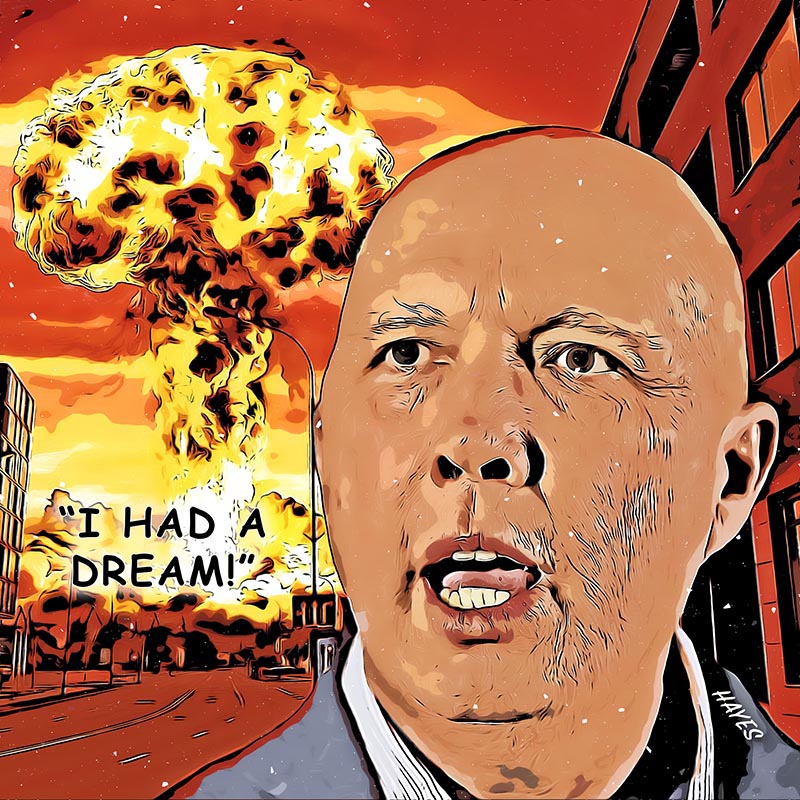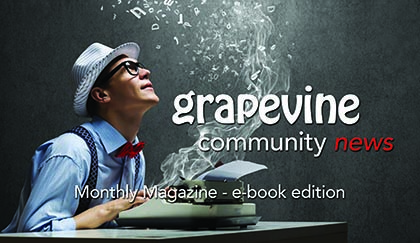

Dutton at the helm: a political winter?
Peter Dutton as Prime Minister seems an unthinkable prospect, but as we edge closer to an election being called we are reminded of his Trumpist outlook– strongman politics, which also embraced a world view of a Queensland cop.
Although Dutton, when a serving member of the Queensland Police Force, wasn’t party to any of the debauchery within the ‘Police Force’ at that time, under the reign of Joh Bjelke-Petersen, he was every inch a product of the culture and politics. And, just like Donald Trump, he’s a hardman with a self-serving plan – from Queensland detective to leader of the Opposition, from property investor to minister for Home Affairs. Dutton’s story is one of ambition, race and power, and the desire to rule.

Dutton's dream for the nuclear proliferation of Australia, despite what he claims, is dangerous and fies in the face of clean, green, inexpensive base-load power - concentrated solar thermal energy. It's time Dutton took a leaf out of the "Howard Handbook', which banned nuclear expansion in Australia - for good reason.
5 February 2025
ALAN HAYES
DUTTON became the Opposition leader with a strategy to win outer-suburban and regional seats from Labor. Since then we have seen his demolition of the Voice, a rolling campaign of culture wars and an inane madness to become ‘nuclear man’.
So, what does Peter Dutton really know about the Australian electorate? Has he merely updated Menzies’ Forgotten People pitch for the age of anxiety, or will he collapse the Liberals’ broad church? It is a revelatory portrait that is sardonic, perceptive and altogether compelling, which begs the same issue, raised in the famous line from a poem by Robert Burns - written to a mouse whose house suddenly gets ploughed over by a farmer, despite the mouse's careful planning: “The best-laid plans of mice and men oft' go awry”.
Dutton’s ‘Trumpist tactics’ have allowed him to redraw the battle lines of Australian politics without becoming Prime Minister – straight out of the ‘Mad King’ of America’s handbook … Dutton’s reason for being? Make Australia afraid again – an unsettling parallel with the Trumpian dogma.
But there is no doubt that Peter Dutton is a serious strongman in the current age of uncertainty, paranoia and anxiety – offering himself as the lesser of two evils.
Moment after moment of madness
Let’s not forget, however, that Peter Dutton is merely just another of those wheels within wheels – not any ordinary centre-right politician, but one who recognised the political capital to be gained from tapping into the darker recesses of the Australian imaginary.
Dutton’s continual fight with Albanese over parochial voters has dragged apace the political conversation rightwards: on race, immigration, gender and Labor’s transition away from fossil fuels. The latter, a political and economic Liberal insanity that is at very core of the ‘Dutton-Nuclear-Plan’, which will mean higher electricity prices, less economic growth, and much more risk.
But there’s even more to the Dutton-type of inconsistent and frightening-style of leadership – like a dog chasing a ‘Trumpian tail’, there is a dangerous ambivalence. Dutton was among the tiny number of MPs who thought it would be a great idea to boycott Kevin Rudd’s apology to the Stolen Generations. He opposed same-sex marriage. And, in a country that, so far, has largely resisted the populist revolt that has afflicted so many other Western countries – a country where recognition of the benefits of immigration and the value of multiculturalism has been robust – he has railed against what has made Australia great and sought to undermine the very fabric of goodness that is part of our unique way of life by conceptualising the accumulation of resources and power built through relationships, trust, goodwill, and influence between politicians and the people.
But if Labor thinks that by focusing on Peter Dutton’s flaws will be enough to keep them in office, it is forgetting the lessons of very recent history. How did things turn out the last time the ALP was up against an apparently “unelectable” “embarrassment”?
Anthony Albanese needs to rethink; denouncing Dutton as “nasty and divisive“ just doesn’t cut it. Labor is falling into the same trap when they were up against Tony Abbott: “obsessing about him and thinking if it can just find the right attack line, voters will realise how awful he is and flock back to them”.
That’s not saying that Dutton will win the battle with Anthony Albanese in the upcoming election, but he is well and truly in the fight, and that should have Labor purists nervous and Coalition supporters feeling an unlikely confidence.
Albanese must live up to the promise he has made to his caucus of a more ambitious reform agenda in a second term - they crave a unifying vision. Instead, Anthony Albanese appears to remain committed to a business-as-usual political and economic strategy, while his opponents have ditched the rules.
Managing but not governing; in charge but not in power; and deciding but not leading, has lead to a drift in Labor’s support - promising voters more of the same that they’ve been given over the past two-and-a-half years is not what punters are looking for. Albanese needs to give the voters what they hunger after – a strong leader with a strong vision for the future.
The local scene
On the Central Coast, there is no doubt that the seats of Robertson and Dobell are firmly in the sights of the Liberals.
Lucy Wicks
In Robertson, the Liberals have rolled out the hitherto defeated member Lucy Wicks for another bite at the cherry – a peculiar choice.
Dr Gordon Reid secured the bellwether seat from Lucy Wicks in 2022, who had previously held the seat for nine years, with a swing of 7 per cent to Labor. The people had expressed their dissatisfaction with her and the Liberal Party.
Since winning the seat of Robertson, Gordon Reid has been a terrier for his constituents – a popular local member that achieves results. So, why have the Liberals put forward a lame duck to contest the seat? And what does Lucy Wicks stand for? She was reported as saying to the Sydney Morning Herald on 30 November 2024, after her preselection as the Liberal candidate, “I hope to stand up and champion my community and say, life can be better. Things can be better.”
But did Lucy Wicks really concern herself with championing her community when she was previously the Member for Robertson?
When the Central Coast Community was in the thick of the campaign to stop longwall coal mining beneath the Central Coast’s major water catchment district, community campaign director Alan Hayes sat down with Ms Wicks and discussed the Commonwealth’s role in the approval process for the coal mine.
Before any state approvals for mining can be granted the development application must also be signed off by the Commonwealth under the provisions of the Environment Protection and Biodiversity Conservation (EPBA) Act. The EPBA Act is designed to protect endangered and threatened species of flora and fauna.
In the water catchment district there are nineteen species of threatened and endangered fauna, including a number of endangered migratory birds that are subject to international protection agreements with Japan, China and South Korea.
The facts were presented to Ms Wicks and she confirmed an appointment, with then Federal Environment Minister, Josh Frydenburg, for Alan Hayes had been made to meet with Mr Frydenburg. Yet, unbeknown to the community, Lucy Wicks had also arranged for the coal company to virtually walk in the door to secure consent under the EPBA Act from the Environment Minister following the meeting with Mr Hayes.
In a subsequent meeting with Mr Hayes, Ms Wicks was unrepentant for her actions. This raises the obvious question: was Ms Wicks really concerned in championing her community?
When previously in parliament, Lucy Wicks voted consistently against the Australian Renewable Energy Agency (ARENA); voted consistently for decreasing availability of welfare payments; voted consistently against a carbon price; voted consistently against a minerals resource rent tax; voted consistently against considering legislation to create a federal anti-corruption commission (procedural); voted consistently against increasing investment in renewable energy; voted consistently against increasing legal protections for LGBTI people; voted consistently against increasing protection of Australia's fresh water; voted consistently against letting environmental groups challenge the legality of certain government decisions; voted consistently against requiring every native title claimant to sign land use agreements; voted consistently against transgender rights; and the list goes on –she was supposedly voting for you!
Lucy Wicks is just a political party follower, not a community advocate.
Brendan Small
What do we know about the Dobell candidate? He is a local businessman, who will tell you that he has been doing a lot of listening; that’s what all candidates do, but does it equate to results.
In his electronic campaign mailouts he has extolled the Liberal plan for Australia - reduce living costs, reduce energy costs, build more homes and restore the dream of home ownership, and to reduce migration.
Brendan Small said, “We believe our plan will help thousands of Australians, including locals here in Dobell.”
“As your Liberal candidate for Dobell I’m working to deliver our plan to build a stronger economy and get our country back on track.”
Yet, when you click on the link in Mr Small’s e-mailout, encouraging you to read more about the Liberals plan, the following message pops up: The requested link could not be found. Please check the URL.
So, why was the link invalid?
Peter Dutton had back-peddled on his plan for Immigration that he’d been harping about for months, one of the Liberals strong points - a promise to cut net migration. Dutton had previously said, “Net migration to Australia reached almost 1 million people… it is unsustainable and is severely impacting our social and economic infrastructure.
“We will rebalance our migration program to restore confidence and integrity, and to relieve pressure on housing and community services.”
An alleged claim, among others, that Mr Small ran with.
“The Coalition will not set a target for net migration until after the election,” Opposition Leader Peter Dutton said.
Then, just prior to Christmas, came the new Liberal’s plan for ‘Dobellians’ – focusing on lowering inflation by cutting wasteful government spending. But didn’t Dutton up salary expenditure by appointing Jacinta Nampijinpa Price as shadow Minister of Government Efficiency? It sounds a bit familiar to Trumpian politics. From Doge to Smoge, Peter Dutton’s Coalition is an eerie echo of Trump (and Musk’s) America.
On 22 January, Gina Rinehart said: “If we are sensible, we should set up a Doge [Department of Government Efficiency] immediately, reduce government waste, government tape and regulations.”
Mere days later, on 25 January, Peter Dutton appointed Jacinta Nampijinpa Price as the Shadow Minister for Government Efficiency (Smoge?), describing her new job as to cut “wasteful spending”. Yet the move did not get a 'vote of confidence' from shadow money nanagers!
Back to Brendan Small’s election mailouts. He has made it extremely clear that he is a Dutton faithful, following Dutton’s policy and Dutton’s nuclear dream – even though that dream for Australia is ever changing, without any qualification on how the Liberals intend to finance those grandiose schemes.
Mr Small (said) in his mailout, a Dutton Coalition Government will:
- Establish a civil nuclear program in Australia, including operating nuclear power plants in seven locations across the country.
- Unlock more Australian gas to safeguard our energy security and reliability, through streamlined approvals and by encouraging increased exploration and development.
- Develop gas in key basins, like the Beetaloo, and include new gas generation in the capacity investment scheme.
But is Mr Small just merely parroting the Liberal Party agenda, without researching the viability of the plan and actually having any knowledge of the adverse impact the Dutton plan will have upon Australians?
Has Mr Small asked his leader how he believes that unlocking more gas will safeguard our energy security? The fact is, gas is expensive! Why? Because every kilojoule of gas extracted by the mining companies is royalty and tax free and sold overseas at a huge profit – Aussie get the shaft, while the gas companies get the mine; not prepared to sell gas competitively on the local market – Australians pay world-parity prices.
In a conversation that Alan Hayes had with Brendan Small (he identified myself as editor of the Grapevine), it was evident that he was just echoing his party line without any apparent knowledge at all of the alternatives for cheaper energy, in particular sustainable, base-load green electricity – concentrated solar thermal power (CSP). We already have two CSP plants in Australia – the CSIRO pilot plant in Newcastle and the MARS food factory in Victoria. A third CSP plant is currently under construction in South Australia. It’s clean electricity 24/7!
CSP is quicker and cheaper to build, cheaper to supply and CSP plants have a lifespan of around 54-years. This was all explained to Mr Small, but it is now blatantly apparent he does not want to rock Dutton’s desire to become ‘Nuclear Man’.
Dutton’s nuclear dream
And what about Dutton's desire to proliferate nuclear power in Australia? Back in the day, when John Howard was the Liberal Prime Minister, he banned nuclear power for good reason - nuclear accidents; fission produces radioactive waste; high development and construction costs; dwindling fuel supply on the horizon; nuclear proliferation security concerns; lengthy construction time frames; and difficult to decommission.
Going nuclear means Aussies pay more, for less - Australia’s independent science agency, CSIRO, has found that building solar and wind power backed by storage is the lowest-cost way to meet our electricity needs. Unlike renewables, the cost of building and operating nuclear energy in Australia remains prohibitively high.
In December 2024, the Federal Coalition released its nuclear costings. Unfortunately, as expected, these costing contain a number of misleading assumptions and omissions. Their scheme doesn’t provide enough electricity to meet our needs, underestimates the cost of building and operating nuclear reactors compared to similar nations overseas, and ignores the eyewatering costs of more climate pollution and worsening unnatural disasters.
The Clean Energy Council found that the Federal Coalition’s nuclear scheme would cost up to $490 billion more than they’ve estimated and add one billion tonnes more climate pollution from burning more coal and gas while waiting for nuclear reactors.
Federal Opposition Leader Peter Dutton and the Liberal-National Coalition have said that, if they win the next Federal Election, they would attempt to build nuclear reactors in communities around Australia to produce electricity.
But seriously, does anyone want the possibility of a nuclear reactor coming to a location near them?








.jpg?crc=4257584689)










_web.jpg?crc=282450513)



